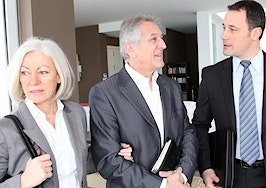- Realty One Group, the fast-growing Irvine, California-based brokerage of 8,500 plus agents, is using its team model to help it with ambitious growth plans.
- CEO Kuba Jewgieniew said he treats his team leaders as mini-CEOs.
- Teams say they liked the freedom, culture and flat fee commission deal they get at Realty One Group.
A few months ago, team leader Jeff Sibbach hopped in his Tesla and headed from Scottsdale, Arizona, to the California coast.
With his vice president of operations and marketing, Phil Sexton, in tow, the Realty One Group (ROG) duo set off on a friendly mission to keep their competition close — in other words, learn about how other teams at the company were finding success.

Kuba Jewgieniew
“In [Realty One Group’s] back office system, you can see what the other agents are doing, who has got more production as an incentive,” Sibbach explained.
Teams in Irvine, where ROG’s head office is based, and northern San Diego had some of the strongest track records, so the Arizonans hit the road.
Launched in 2005, ROG is known for its flat fee agent commission structure and fast expansion.
Today, a key element of the company’s growth strategy is its sharpened focus on real estate teams, which are designed to foster entrepreneurial thinking via “mini businesses” bolstered by the safety net of a brokerage.
Critics of teams in real estate argue that the structure can allow low producers to hide behind more successful agents, while loose monitoring and shared responsibility can leave consumers compromised. And the National Association of Realtors’ (NAR) 2015 DANGER report warns that teams can pose long-term liability issues to brokerages.
ROG’s team formula, with defined leadership and training, appears to give its teams the environment and support they need to close deals, while compliance is a big focus.
The company’s agents and leaders speak of the freedom to innovate, a collaborative atmosphere and the scalability to keep expanding.
This is a priority for the independent brokerage, which ranked fifth in the 2016 Real Trends Power Broker report in both transaction numbers and volume and has claimed a spot on either the Inc. 500 or Inc. 5000 list of fastest-growing private companies for seven consecutive years.
Teams for today and more so for tomorrow
ROG founder and CEO Kuba Jewgieniew has always had his sights set on growth, and in Oct. 2012, the company became a franchisor.
Jewgieniew is a supporter of agent teams and what they can do for his company, which houses more than 8,500 agents, posts a sales volume of $9.9 billion and operates 72 offices in 17 states.
The team structure will be a big part of the company’s franchise expansion plans, which include building a footprint in Wisconsin, Ohio and throughout the Midwest.
“I am a big believer that teams are for today — and in order for ROG to be competitive and successful, teams are even more so important for tomorrow,” he said.
The company couldn’t provide an exact number for total teams operating under the ROG umbrella, but said they range in size from two to 200.
Sibbach, however, estimates the company currently houses about 100 teams, referring to groups with multiple agents, and another 150 to 200 or more of husband-and-wife style teams, or teams made up of a referencing agent, lender, title and office transaction coordinator.
Measuring up to other team-focused franchisors
ROG, of course, isn’t the first franchisor to support the team model, nor is it the the first to develop an environment that is friendly to teams.
Keller Williams (KW) is a leader in this arena. Pacific Union, Sotheby’s International Realty, Re/Max, Douglas Elliman (and more) all have successful team track records, too.
On the Real Trends’ team rankings by sales volume and transaction sides over the last couple of years, some of these franchisors and brokerages dot the list and claim spots toward the top (KW has 118 agent teams on the list of top producers alone, according to the company’s public relations strategist, Darryl Frost).
ROG’s Russell Shaw Group in Arizona ranked at No. 109 for sides in 2015, but the franchisor is still catching up to the more established leaders in the team realm — and time will tell whether it will find its place among the giants.
Team best practices
Agents and brokers in Inman’s Special Report on real estate teams stressed that there were some important rules to play by if agents are going to get a team right.
Nearly 80 percent of those surveyed, for instance, believe a team has to be run by a designated leader.
Moreover, the research showed that each team member should be given clear guidelines about their roles.
Jillian Batchelor, a veteran team leader in Las Vegas who has had small teams at other brokerages prior to ROG, said that the team experience differs at ROG for a couple of reasons: training and the company culture.
Currently, ROG provides on-site training by real estate coaches to support the team leader.
“I’ve seen teams stumble with no game plan,” she said. “They come together; they don’t know how the hierarchy will work; they have no systems; they don’t know what to do to make a successful couple make a team together.”
Her view on ROG: “They offer a lot of team training; they help with team structure, and they are the most innovative company I’ve ever worked for — and it comes from the top down.”
At ROG, team members work as an individuals — when they complete a transaction they are paid for their own transaction and keep the credit, and the volume isn’t attributed under the team leader’s name.
In addition, the company recently started posting live Facebook videos on teams and has offered a team seminar with more plans along those lines for the future, said company’s director of communications, Brea Ballard.
Teams gaining ground
Jewgieniew thinks there will be a place for individual agents and teams at ROG, but they will play different roles.
Meanwhile, the company is witnessing its teams gain a foothold in their markets without sacrificing the time, money and client attention required of most startups.
“In the future, no one knows what it will look like, but it is likely the individual agent will be an adviser and facilitator pre and pending a transaction,” he said.
“As far as teams go, they will be business leaders, mini CEOs of their business, running a business within a business.”
The team model has helped ROG oversee groups of agents as it’s expanded.
One of the company’s largest teams, made up of 90 members, is in Las Vegas, for example.
To wrangle that beast, Jewgieniew said the company built a “strong bond with our business leaders, while our managing brokers are there to support them so they can focus their attention on the success of their team members.”
Jewgieniew also said he will recruit entire teams when the fit is right, and if new licensees are interested in ROG, the firm will help them join teams as well.
What teams can do for their brokerage — and what’s at risk
For Bill Lublin, CEO of Century 21 Advantage Gold in Pennsylvania, it makes sense for successful team leaders to strike out on their own and become a company owner upon achieving certain level of success. Then when the time to retire comes, they have something to sell.
“I think teams are useful for growth, but in our company, forming a team would be a stepping stone. I would then encourage the team leader to become a principal in our firm. I have a number of partners in the company who have done this it this way,” he said.
“Having teams requires a balance in your business plan since it can be very painful for a real estate company to lose a big successful team if it doesn’t have enough production outside the team environment to carry the day. ”
Moreover, NAR’s 2015 DANGER Report, commissioned from real estate consultant Stefan Swanepoel, listed real estate teams as one of the biggest threats to the real estate brokerage industry.
According to the report, brokerages benefit from the revenue a team can bring in but should be aware of their power: teams might end up generating more revenue for themselves while leaving the brokerage liable for any transaction compliance issues.

Patrick Marrelly
ROG team leader Patrick Marrelly of The Marrelly Group is ranked No. 1 within ROG for dollar volume in California, No. 2 overall with 92 transactions this year and claims over $56 million in sales. (He was one of the leaders in San Diego whom Sibbach traveled to meet with.)
He argues that having high-performing team leaders has an exponential effect because it’s like having “headhunters all over the nation,” building a population of agents. Most teams provide their agents with leads, which makes them more productive, he said.
Why doesn’t Marrelly set up his own brokerage?
A few reasons: help with compliance, cost considerations and the freedom he already has in marketing his team.
“The reason I stay with Realty One [Group] is because the cost of doing what they are doing is lower, having [ROG] do it rather than me hiring someone to do it,” he said.
“I feel like I’m not working for them, but that we are partners. I bring in the business; they make sure it complies. That’s something that I wouldn’t do if you paid me.”
Another thing he likes in ROG’s approach to teams is that he can build his own identity.
“Kuba [Jewgieniew] doesn’t spend a lot of money marketing me, but personally we spend $25,000 or $30,000 a month marketing our team. If you are doing that and work for somebody who doesn’t let you take that brand public, that’s a real problem.”
The horse race
Jewgieniew likes the road trip story of the entrepreneurial Sibbach taking matters into his own hands, getting in the car to go and chat with other teams and seeing what others are doing better.
As a tech-savvy team leader, Sibbach has ambitions to get to a $300 million sales volume in the next three to five years. He is currently at $103 million over the last 12 months, and his team of 35 has 11 producing agents with 15 more under development.
Jewgieniew said: “These are sales people. It’s like a horse race; it’s all competitive — that’s good. There’s an informal accountability system — they want to be around winners and all match up against each other.”
A reason why Sibbach hosts his team with ROG is that “they get out of my way,” he said.
He likes the low cost structure, which allows him to nix expenses he doesn’t see the value in, like print advertising.
Instead, he says, speaking of his marketing VP, “I got to hire a Phil.”













